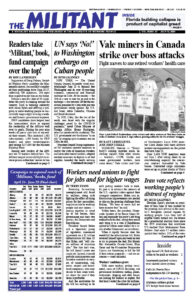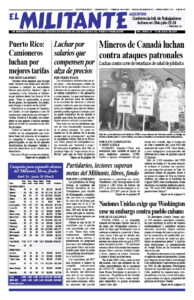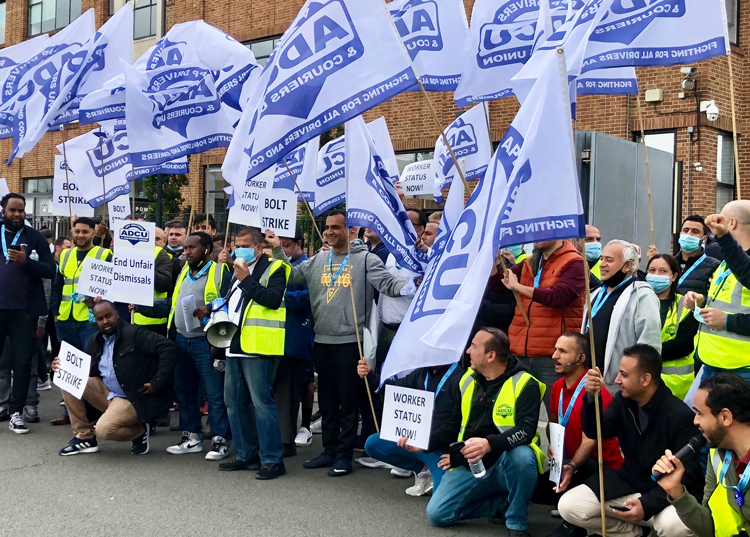LONDON — Chanting “Enough is enough!” and “Driver power!” 100 members of the App Drivers and Couriers Union protested outside the London offices of the app-based Bolt cab hailing company here June 22. The action marked the start of a 24-hour strike where drivers log off the Bolt app and ask people not to use it.
“We’re here to demand ‘worker status,’” union leader Yaseen Aslam told the Militant. In 2016 Aslam and App Drivers and Couriers Union Secretary James Farrar initiated court action against the insistence by Amsterdam-based Uber that its drivers were self-employed. After five years of legal battles, and strikes and protests by the drivers, the Supreme Court in February ruled that the company must grant “worker status” to them. “Uber underestimated us,” Aslam said.
Similar legal victories have been won in Spain, Italy, the Netherlands, France and Belgium. Now, the union is taking action to force other U.K. operators, like Bolt, Ola, and FreeNow to recognize the ruling applies to them also.
Bolt claims it doesn’t apply because they have a different “operating model.” The Estonia-based company operates in 40 countries, employing more than 1.5 million drivers. In the U.K. it operates in London, Birmingham, and four other cities.
Worker status should mean that cab drivers are entitled to the minimum wage, holiday pay, and legal protection from being disciplined over so-called whistle-blowing.
Uber has refused to implement the part of the court decision that says drivers’ minimum wage starts when they log onto the app. The company will pay only from when a ride is started. “Uber does what it can to avoid the consequences of the court ruling. But the ruling was an important victory, a foundation upon which we can build,” Farrar told the Militant, a judgment proudly shared by other drivers present.
In another development, Uber last month agreed to bargain collectively with the GMB union, the first time the company has recognized a union anywhere in the world. Uber agreed to meet with the union quarterly to discuss matters like health and safety. But it has refused to bargain over drivers’ income. The GMB estimates that tens of thousands of Uber drivers are entitled to back pay, amounting to as much as 12,000 pounds ($16,660) each. Thousands have initiated legal action.
Arbitrary ‘deactivation’
“Although our income hasn’t improved, ‘worker status’ gives us greater protection and opens greater opportunity for our union to defend drivers’ rights, for example against arbitrary deactivation of drivers,” said Asim Bajwa.
Protesters told us about their personal experiences of being taken off the work list. “When I was ‘deactivated,’ it took me a week to get back working,” said Lee Ali, who’s been driving for Uber for six years and for Bolt for two. “I had done nothing wrong whatsoever. But I had to ‘prove my innocence’ with dashcam photos. But no work, no pay. So, for having done nothing wrong, I lost a week’s money.”
In the past Uber has been accused of deactivating drivers who stood up for themselves, a form of victimization and a warning to others. If company deactivation is supported by Transport for London, an agency under London’s mayor, the driver loses access to all platforms. And today drivers can be deactivated through an algorithm!
The drivers have been fighting for a raise to 2 pounds a mile for two years. “We currently get 1.25 pounds a mile and 15 pence a minute,” driver Suleyman Bozkurt told us. “Then Bolt takes 15% ‘commission.’ Out of what we earn, we have to pay for the car, its maintenance, insurance, and we must put away enough money to get a new car after a few years, given we’re driving thousands of miles every month. I’m working 12-hour days and taking home the same as I did when working as a bus driver on an eight- or nine-hour shift over 15 years ago!”
Bolt driver Korado Jaku, who came to the U.K. when he finished his studies in Greece and has been driving since, said taking part in union actions has “learned” him. “I’ve found we’ve got to fight for the most basic rights,” he said.


